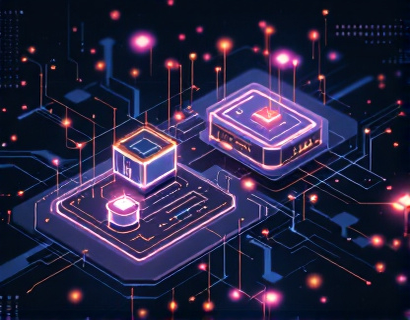Mastering Digital Currency Creation: A Guide to Cutting-Edge Software for Businesses and Blockchain Innovators
In the rapidly evolving landscape of blockchain technology, the ability to create and manage digital currencies has become an essential skill for businesses and innovators. This guide delves into the advanced software tools designed to simplify the complex process of launching and managing digital tokens and currencies. By focusing on unparalleled customization, robust security, and seamless scalability, these tools make blockchain technology accessible and manageable for both novices and experts.
Understanding Digital Currency Creation
Digital currencies, often referred to as cryptocurrencies, operate on blockchain technology, a decentralized ledger that ensures transparency, security, and immutability. Creating a digital currency involves several steps, from designing the token's specifications to deploying it on a blockchain network. The process can be daunting, but with the right software, it becomes a streamlined and efficient task.
Key Features of Advanced Digital Currency Software
Advanced software for digital currency creation offers a suite of features that cater to the diverse needs of businesses and blockchain enthusiasts. These features include:
- Customizable Token Parameters: Define the number of tokens, token distribution models, and other essential attributes.
- Robust Security Measures: Implement advanced cryptographic techniques to ensure the integrity and security of the currency.
- Seamless Integration: Easily integrate the currency with existing blockchain platforms and applications.
- Scalability Options: Design the currency to handle increasing transaction volumes and user bases without performance degradation.
- User-Friendly Interfaces: Intuitive dashboards and tools that simplify the management and monitoring of the currency.
Customization Options
One of the most significant advantages of using advanced digital currency software is the level of customization it offers. Users can tailor the token's specifications to meet specific business goals and market requirements. Key customizable parameters include:
- Token Supply: Determine the total number of tokens to be created, which impacts scarcity and value.
- Token Distribution: Choose from various distribution models such as airdrops, ICOs, or pre-sales to suit the launch strategy.
- Smart Contract Functionality: Incorporate complex logic and automate processes using smart contracts.
- Staking and Rewards: Implement mechanisms for staking tokens to encourage long-term holding and reward active participants.
Security Features
Security is paramount in the world of digital currencies. Advanced software ensures that the created tokens are protected against various threats. Key security features include:
- Cryptographic Hashing: Use of secure hashing algorithms to ensure data integrity and prevent tampering.
- Private Key Management: Secure storage and management of private keys to prevent unauthorized access.
- Multi-Signature Wallets: Enhance security by requiring multiple signatures for critical transactions.
- Regular Audits: Conduct thorough security audits to identify and mitigate vulnerabilities.
Scalability and Performance
As the user base and transaction volume grow, the digital currency must scale efficiently without compromising performance. Advanced software addresses this by:
- High Throughput: Designing the blockchain to handle a large number of transactions per second.
- Low Latency: Ensuring fast transaction confirmation times to provide a smooth user experience.
- Cost-Effective: Optimizing the consensus mechanism to reduce gas fees and make the currency more accessible.
- Modular Architecture: Allowing for easy upgrades and enhancements to adapt to future demands.
Benefits of Using Advanced Digital Currency Software
The use of advanced software for digital currency creation offers numerous benefits, making it an attractive option for businesses and innovators:
Firstly, it democratizes access to blockchain technology. With user-friendly interfaces and comprehensive documentation, even those with limited technical knowledge can create and manage their own digital currencies. Secondly, the robust security features provide peace of mind, ensuring that the currency is protected against fraud and cyber threats. Lastly, the scalability and customization options allow for flexibility and growth, enabling businesses to adapt to changing market conditions and user needs.
Case Studies and Success Stories
Several businesses and projects have successfully utilized advanced digital currency software to launch and manage their tokens. For instance, a fintech company used the software to create a stablecoin for cross-border payments, achieving high transaction speeds and low fees. Another project leveraged the customization options to develop a utility token for a decentralized gaming platform, enhancing user engagement and reward mechanisms.
These success stories highlight the versatility and effectiveness of advanced digital currency software. They demonstrate how the right tools can transform the process of creating and managing digital currencies, leading to innovative and impactful applications.
Getting Started with Digital Currency Software
For businesses and blockchain enthusiasts looking to enter the digital currency space, here are the steps to get started with advanced software:
- Research and Select a Reputable Platform: Look for software that offers the features mentioned earlier and has a strong community and support system.
- Understand the Basics of Blockchain: Familiarize yourself with blockchain concepts, including blocks, nodes, and consensus mechanisms.
- Set Clear Objectives: Define the purpose and goals of your digital currency, whether it's for fundraising, rewarding users, or facilitating transactions.
- Design Token Parameters: Use the software's tools to set the token supply, distribution model, and other key parameters.
- Implement Security Measures: Integrate cryptographic techniques and secure storage solutions to protect the currency.
- Test and Deploy: Conduct thorough testing to ensure everything works as expected before deploying the currency on the blockchain network.
- Monitor and Maintain: Continuously monitor the currency's performance and make adjustments as needed to ensure scalability and security.
Community and Support
Engaging with a supportive community and accessing reliable support are crucial for success. Many advanced software platforms offer forums, documentation, and customer support to help users overcome challenges and optimize their digital currencies. Participating in these communities can also provide valuable insights and best practices from experienced developers and users.
Future Trends in Digital Currency Creation
The landscape of digital currency creation is continually evolving, driven by advancements in blockchain technology and increasing adoption. Some key trends to watch include:
- Interoperability: Development of standards and protocols that allow different blockchains to communicate and transfer assets seamlessly.
- Decentralized Finance (DeFi): Expansion of financial services on blockchain platforms, including lending, borrowing, and decentralized exchanges.
- Non-Fungible Tokens (NFTs): Growth in the creation and use of unique digital assets, opening new opportunities for artists, collectors, and businesses.
- Regulatory Clarity: Increasing efforts to establish clear regulations, providing more certainty and fostering wider adoption.
By staying informed about these trends and leveraging advanced software, businesses and innovators can position themselves at the forefront of the digital currency revolution.
Conclusion
Mastering digital currency creation is no longer the domain of tech experts alone. With advanced software, businesses and blockchain enthusiasts can confidently design, launch, and manage their own digital currencies. The combination of customization, security, and scalability provided by these tools makes the process accessible and efficient. As the blockchain ecosystem continues to grow, the ability to create and manage digital currencies will become an increasingly valuable skill, opening up new opportunities for innovation and growth.










































